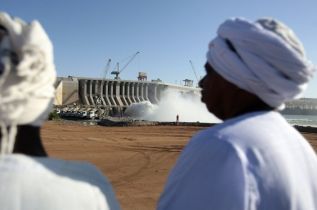Sudan’s Bashir reduces electricity prices
March 3, 2009 (MEROWE) – Sudanese President of Omer Al-Bashir today has reduced by 25% the electricity prices for the housing sector.
 The Sudanese president made this announcement today during a speech he delivered at the inauguration of Merowe Dam at the eve of the International Criminal Court (ICC)’s decision on an application for an arrest warrant related to his responsibility in Darfur crimes.
The Sudanese president made this announcement today during a speech he delivered at the inauguration of Merowe Dam at the eve of the International Criminal Court (ICC)’s decision on an application for an arrest warrant related to his responsibility in Darfur crimes.
Sudan’s Merowe dam project, which would double the country’s electricity output, will produce 250 megawatts of electricity and will reach full capacity by November 2009 by producing 1250 megawatts. The power production of the longest dam in the world will be transferred from the dam area through a 1745 klm long to the national network.
The dam’s total capacity is 1.25 million kilowatt which doubles Sudan’s existing power supply.
Al-Bashir said that the reduction in electricity prices will also cover the industrial sector by 25% and for farmers by 30%, pointing out that the reduction would apply starting as of June 30.
The dam is a multipurpose project designed for power supply and agricultural irrigation. It has a 1.24-billion-cubic-meter reservoir that could help more than 4 million local residents living along the Nile. It will irrigate about two million feddans of agricultural lands.
Bashir also said the celebration that would take place on Tuesday comes as a practical reply to the ICC indictment which “seeks to halt the development wheels in the country and the progressive economic development the country is witnessing.”
The Sudanese government financed 40% of the $2 billion project and the rest was provided by Arab funds (Kuwait, Saudi Arabia and Qatar) as well as long-term loans from the Chinese government.
Despite the many projects and infrastructures building in the area, new airport, bridges, roads, the dam caused controversy and raised the opposition of the local population. People displaced by the project complained they didn’t receive enough compensation. Also they expressed concern at the destruction of the archaeological sites dating to the Pharaonic era.
Over 40,000 people had been forcibly displaced from their home to make way for the dam and the vast reservoir formed behind it, 3500 kilometres north of the Sudanese capital.
(ST)
